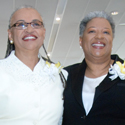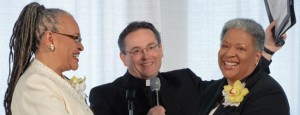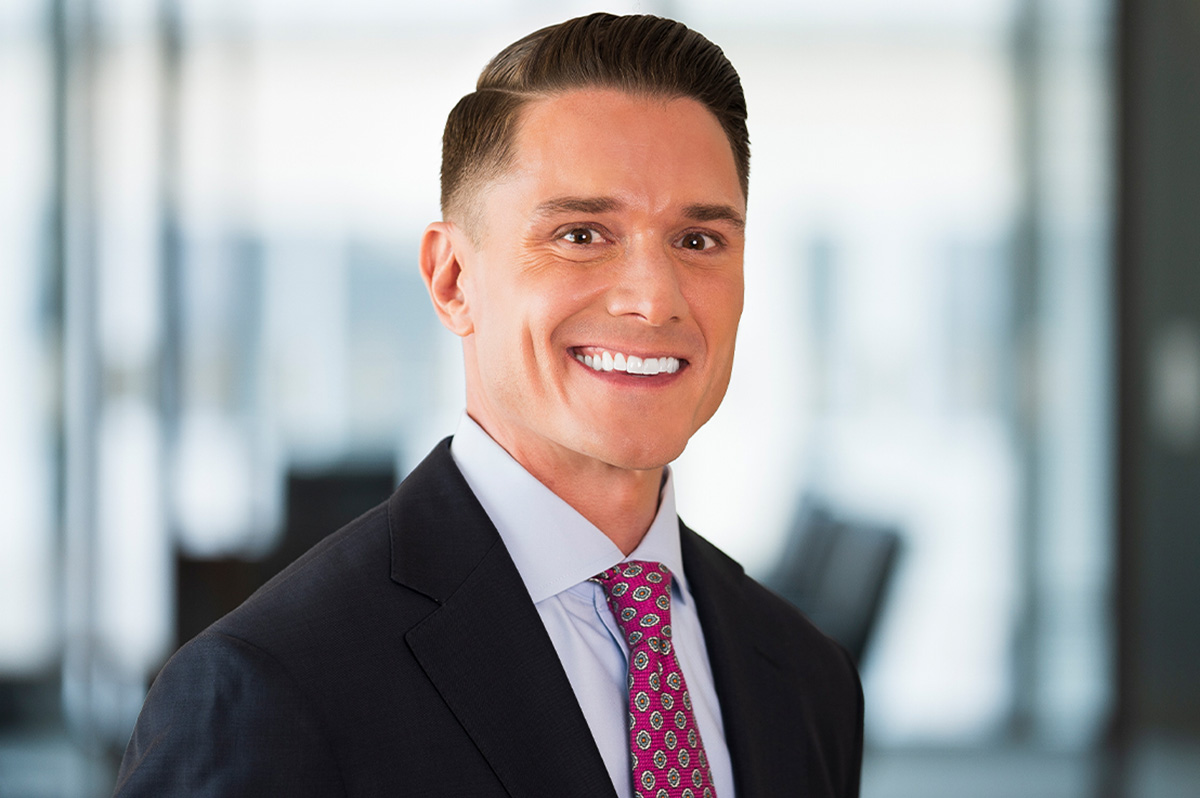Local
Looking back on the hoopla
Black couples took pride in being first to wed in D.C.


Revs. Darlene Garner and Candy Holmes were married at the Human Rights Campaign headquarters on March 9. (Photo by Joe Tresh)
On the eve of this weekend’s Black Pride festivities, the Blade checked in with two of the first same-sex couples who wed here in March to find out how they’re doing now that the hoopla has subsided, how they’ve fared as gay or lesbian couples among their black friends and families and their thoughts on the importance of Black Pride.
Three of the first couples to wed in Washington on March 9, the first day it was legally possible, were Angelisa Young and Sinjoyla Townsend, Reggie Stanley and Rocky Galloway and Revs. Darlene Garner and Candy Holmes. All three couples exchanged vows and rings at a carefully orchestrated event at Human Rights Campaign headquarters. All three couples are black.
“We were all asked to identify couples we knew locally who were planning to seize the opportunity immediately and we all put feelers out,” says Ellen Kahn, HRC’s family project director.
Garner said she thinks it was a coincidence that all three couples are black, but says it was still significant.
“Washington, D.C. is known by some as a chocolate city, so it was great that the first couples to be married were African-American couples,” she said.
Stanley and Galloway, a couple for six years, said no one would have noticed if all the couples had been white and that although they planned to wed regardless, controversial remarks made by Council member Marion Barry, who’s black and represents D.C.’s predominantly black Ward 8, inspired them to get married as soon as the law would allow. Barry, who’d previously been supportive of gay rights, said last year after voting against a bill to recognize same-sex marriages performed elsewhere in D.C., that his Ward “don’t have but a handful of openly gay residents” and that the majority of his constituents are opposed to same-sex marriage.
“He was basically saying that black gay folks don’t exist in his ward so we thought it was important to be visible and present,” Stanley said. Though he and Galloway live in Ward 4, they said they felt it important to show Barry there are many black gay D.C. residents.
Garner and Holmes, who had dated off and on for 14 years, said they decided to wed immediately for several reasons, some practical, others symbolic. As ordained ministers in the Fellowship of Metropolitan Community Churches, a liberal, mostly gay Christian denomination, they felt it was important to make a public stand.
“We recognized in many ways our place as role models as both representative of the black community and the LGBT community locally,” Garner said. “So we were happy to take our stand as a legally married couple standing side by side through the struggles.”
Garner works full-time in ministry but Holmes ministers part-time while also holding a full-time government job. She said that was also a factor in their decision to wed at HRC.
“None of it was lost on us,” Holmes said. “Being a couple and being African American and being lesbian, and with me being a federal government worker and also clergy, that’s a lot and so there are a lot of voices and things we represent, so it’s something we took very seriously and I think that’s significant.”
Stanley knew some HRC leaders through his own LGBT activism work.
“HRC was very forward looking and they were really interested in showing all aspects of what marriage can look like both here and across the country,” he said. “They realized there would be national coverage so I think they realized it was important for this visual to be seen.”
Garner and Holmes initially planned to make themselves available on HRC’s behalf to help field press inquiries and counter the anti-gay marriage stances several local black clergy, such as Bishop Harry Jackson of Hope Christian Church, had taken.
“We were initially going to fly away somewhere and get married,” Garner said. “But when it became clear that we could get married here, they asked if we’d like to do it with them. It became kind of a collaboration.”
Was there any concern their special day would become a circus? Both couples said HRC handled the day so well, it didn’t feel that way.
“There really was no media barrage at all,” Galloway said.
The women agree.
“We were able to experience the typical giddiness of any engaged couple looking forward to their wedding,” Garner said. “HRC did a phenomenal job and our primary focus stayed on the fact that we were getting married. We did not take into consideration at all that the world might be watching.”
Garner and Holmes plan a religious ceremony during their denomination’s annual conference in Acapulco in June.
The couples met standing in line that morning to get their licenses. They had their ceremonies at HRC in the order they got their licenses.
“We all cried and applauded and supported one another,” Holmes said. “Then when one came back, the next couple marched in so we were all there together, then we had a joint reception.”
“It was lovely,” Garner said. “HRC converted one of their big meeting rooms into a wedding chapel and we were able to create the ceremony we wanted to have from processional to recessional, with music and presiders and everything just as we wanted.”
The couples — Young and Townsend did not respond to interview requests — said life has returned to normal after the barrage of media attention.
“Things are great,” Galloway said. “Just like with any wedding, there’s a lot of activity leading up to it, but we’re back to a normal life now.”
Both couples said they encountered zero negative feedback but were greeted with many cheers, applause and congratulations, both on the day itself and after.
“People have recognized me and stop me in the hall to congratulate me,” Holmes said. “It’s been wonderful.”
And both couples say Black Pride remains important. Some of the reasons why, they said, popped up during the marriage wars, with the Barry incident and elsewhere.
“We were more active with it in our single days than in later years,” Galloway said. “But it’s still important to show diversity among the gay community. It’s a wonderful weekend and continues to be a very important event.”
Garner and Holmes will be out of town this weekend but said they fully support Black Pride. Garner, one of the founders of the National Coalition of Black Lesbians and Gays, said misperceptions about black gays persist.
“There’s still this perception that all gay people are white and that all black people are straight and many people really cling to that myth,” she said. “So it’s especially important for black LGBT people to come out, be visible and speak out so we continue to break down the barriers that other people have constructed to keep us all segregated from each other.”

The Comings & Goings column is about sharing the professional successes of our community. We want to recognize those landing new jobs, new clients for their business, joining boards of organizations and other achievements. Please share your successes with us at [email protected].
The Comings & Goings column also invites LGBTQ+ college students to share their successes with us. If you have been elected to a student government position, gotten an exciting internship, or are graduating and beginning your career with a great job, let us know so we can share your success.
Congratulations to David Reid on his new position as Principal, Public Policy, with Brownstein Hyatt Farber Schreck. Upon being named to the position, he said, “I am proud to be part of this inaugural group of principals as the firm launches it new ‘principal, public policy’ title.”
Reid is a political strategist and operative. He is a prolific fundraiser, and skilled advocate for legislative and appropriations goals. He is deeply embedded in Democratic politics, drawing on his personal network on the Hill, in governors’ administrations, and throughout the business community, to build coalitions that drive policy successes for clients. His work includes leading complex public policy efforts related to infrastructure, hospitality, gaming, health care, technology, telecommunications, and arts and entertainment.
Reid has extensive political finance experience. He leads Brownstein’s bipartisan political operation each cycle with Republican and Democratic congressional and national campaign committees and candidates. Reid is an active member of Brownstein’s pro-bono committee and co-leads the firm’s LGBT+ Employee Resource Group.
He serves as a Deputy National Finance Chair of the Democratic National Committee and is a member of the Finance Committee of the Democratic Governors Association, where he previously served as the Deputy Finance Director.
Prior to joining Brownstein, Reid served as the Washington D.C. and PAC finance director at Hillary for America. He worked as the mid-Atlantic finance director, for the Democratic Senatorial Campaign Committee and ran the political finance operation of a Fortune 50 global health care company.
Among his many outside involvements, Reid serves on the executive committee of the One Victory, and LGBTQ Victory Institute board, the governing bodies of the LGBTQ Victory Fund and Institute; and is a member of the board for Q Street.
Congratulations also to Yesenia Alvarado Henninger of Helion Energy, president; Abigail Harris of Honeywell; Alex Catanese of American Bankers Association; Stu Malec, secretary; Brendan Neal, treasurer; Brownstein’s David Reid; Amazon’s Suzanne Beall; Lowe’s’ Rob Curis; andCornerstone’s Christian Walker. Their positions have now been confirmed by the Q Street Board of Directors.
District of Columbia
D.C. pays $500,000 to settle lawsuit brought by gay Corrections Dept. employee
Alleged years of verbal harassment, slurs, intimidation

The D.C. government on Feb. 5 agreed to pay $500,000 to a gay D.C. Department of Corrections officer as a settlement to a lawsuit the officer filed in 2021 alleging he was subjected to years of discrimination at his job because of his sexual orientation, according to a statement released by the American Civil Liberties Union of D.C.
The statement says the lawsuit, filed on behalf of Sgt. Deon Jones by the ACLU of D.C. and the law firm WilmerHale, alleged that the Department of Corrections, including supervisors and co-workers, “subjected Sgt. Jones to discrimination, retaliation, and a hostile work environment because of his identity as a gay man, in violation of the D.C. Human Rights Act.”
Daniel Gleick, a spokesperson for D.C. Mayor Muriel Bowser, said the mayor’s office would have no comment on the lawsuit settlement. The Washington Blade couldn’t immediately reach a spokesperson for the Office of the D.C. Attorney General, which represents the city against lawsuits.
Bowser and her high-level D.C. government appointees, including Japer Bowles, director of the Mayor’s Office of LGBTQ Affairs, have spoken out against LGBTQ-related discrimination.
“Jones, now a 28-year veteran of the Department and nearing retirement, faced years of verbal abuse and harassment from coworkers and incarcerated people alike, including anti-gay slurs, threats, and degrading treatment,” the ACLU’s statement says.
“The prolonged mistreatment took a severe toll on Jones’s mental health, and he experienced depression, Post-Traumatic Stress Disorder, and 15 anxiety attacks in 2021 alone,” it says.
“For years, I showed up to do my job with professionalism and pride, only to be targeted because of who I am,” Jones says in the ACLU statement. “This settlement affirms that my pain mattered – and that creating hostile workplaces has real consequences,” he said.
He added, “For anyone who is LGBTQ or living with a disability and facing workplace discrimination or retaliation, know this: you are not powerless. You have rights. And when you stand up, you can achieve justice.”
The settlement agreement, a link to which the ACLU provided in its statement announcing the settlement, states that plaintiff Jones agrees, among other things, that “neither the Parties’ agreement, nor the District’s offer to settle the case, shall in any way be construed as an admission by the District that it or any of its current or former employees, acted wrongfully with respect to Plaintiff or any other person, or that Plaintiff has any rights.”
Scott Michelman, the D.C. ACLU’s legal director said that type of disclaimer is typical for parties that agree to settle a lawsuit like this.
“But actions speak louder than words,” he told the Blade. “The fact that they are paying our client a half million dollars for the pervasive and really brutal harassment that he suffered on the basis of his identity for years is much more telling than their disclaimer itself,” he said.
The settlement agreement also says Jones would be required, as a condition for accepting the agreement, to resign permanently from his job at the Department of Corrections. ACLU spokesperson Andy Hoover said Jones has been on administrative leave since March 2022. Jones couldn’t immediately be reached for comment.
“This is really something that makes sense on both sides,” Michelman said of the resignation requirements. “The environment had become so toxic the way he had been treated on multiple levels made it difficult to see how he could return to work there.”
Virginia
Spanberger signs bill that paves way for marriage amendment repeal referendum
Proposal passed in two successive General Assembly sessions

Virginians this year will vote on whether to repeal a state constitutional amendment that defines marriage as between a man and a woman.
Democratic Gov. Abigail Spanberger on Friday signed state Del. Laura Jane Cohen (D-Fairfax County)’s House Bill 612, which finalized the referendum’s language.
The ballot question that voters will consider on Election Day is below:
Question: Should the Constitution of Virginia be amended to: (i) remove the ban on same-sex marriage; (ii) affirm that two adults may marry regardless of sex, gender, or race; and (iii) require all legally valid marriages to be treated equally under the law?
Voters in 2006 approved the Marshall-Newman Amendment.
Same-sex couples have been able to legally marry in Virginia since 2014. Former Gov. Glenn Youngkin, who is a Republican, in 2024 signed a bill that codified marriage equality in state law.
Two successive legislatures must approve a proposed constitutional amendment before it can go to the ballot.
A resolution to repeal the Marshall-Newman Amendment passed in the General Assembly in 2025. Lawmakers once again approved it last month.
“20 years after Virginia added a ban on same-sex marriage to our Constitution, we finally have the chance to right that wrong,” wrote Equality Virginia Executive Director Narissa Rahaman on Friday in a message to her group’s supporters.
Virginians this year will also consider proposed constitutional amendments that would guarantee reproductive rights and restore voting rights to convicted felons who have completed their sentences.
-

 District of Columbia4 days ago
District of Columbia4 days agoD.C. Council gives first approval to amended PrEP insurance bill
-

 2026 Midterm Elections4 days ago
2026 Midterm Elections4 days agoLGBTQ Victory Fund looks beyond Washington for change in 2026
-

 National4 days ago
National4 days agoHuman Rights Watch sharply criticizes US in annual report
-

 Italy4 days ago
Italy4 days ago44 openly LGBTQ athletes to compete in Milan Cortina Winter Olympics


















